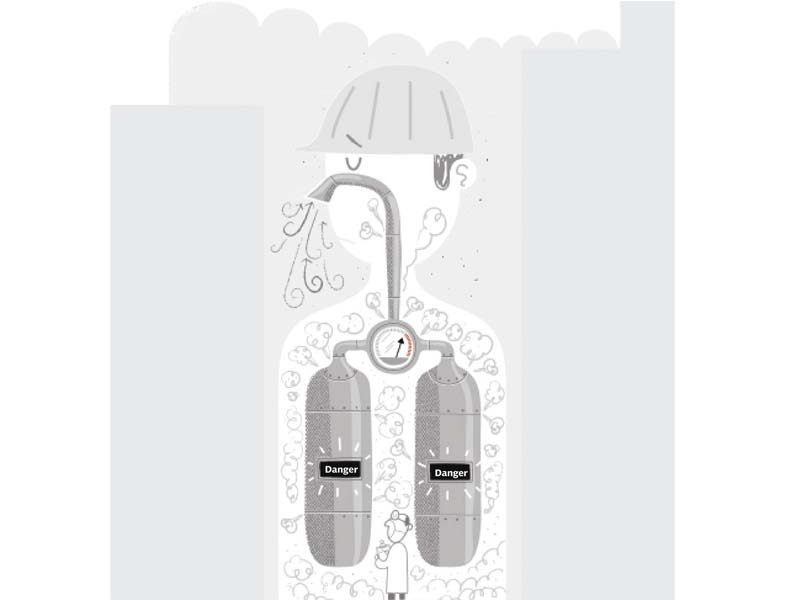
Muhammad Haroon splashes water across his dark-skinned face. The water, now almost black, drains into the sink basin. He rubs his eyes, blinking a few times, hoping to get rid of the burning sensation that is a constant. There is little relief. He will have to repeat the exercise every few hours. The blackness is everywhere, most evident on the surface of the white appliances in his one-bedroom house.
This is the story of every household in Machhar Colony — unofficially Pakistan’s largest slum settlement. “Sometimes, it even gets too hard to breathe,” says Haroon. Thousands of tons of coal are dumped and stocked near the railway tracks that run along the length of Machhar Colony before being transported to other parts of the country. Residents say the activity started in the first week of August. “It was almost the same three years ago,” one resident recalls.
The coal dust has settled and covered every road, street, rooftop, window and even the leaves of trees in the colony. And this is where it is most apparent. What the residents don’t realise is that what they are now breathing is poison for their lungs. The inhaled coal dust progressively builds up in the lungs and cannot be removed by the body, leading to inflammation and even cancer. Oblivious to these hazards, the residents go on with their lives with no precautionary measures as children play in the mounds of coal.
The site where the coal is dumped lies at the centre of two of the most thickly-populated neighbourhoods of the city, with Machhar Colony on one side and Lyari on the other. A drive along Mauripur Road, whose edifices are now blackened by the soot, gives a fair idea of the potential damage the coal may be causing the population.
Health experts and environmentalists have raised concern over the threat to the community and environment that is being brought about by the apathy of authorities, such as the Karachi Port Trust (KPT) and the Sindh environment department.
“It is a public health issue. The health of the nearby communities is at great risk,” commented chest specialist Dr Abdul Ghafoor Shoro. He said that the minute coal particles could inflict irreversible damage to the respiratory system.
Dr Shoro explained that chances of cancer and tuberculosis amplify several fold for people living in these conditions. “It is not an ordinary issue,” he warned. “The government should take immediate notice and shift the coal away from residential areas,” he urged.
Environmentalist Afia Salam says that coal particles will soon affect other parts of the city such as Clifton and Defence Housing Authority as they travel with the air. “Communities living near it are under great threat,” she said, adding that the majority of people are unaware of the threats of coal dust.
Truck drivers, labourers and the people working to transport the coal are not given safety training. They have not even been provided safety gear. “Everything is risky but one has to do the job for the family,” says a labourer, Allah Bachyo*, who loads and unloads the coal from railway cars.
Unaware of the location of the coal, the director-general of the Sindh Environment Protection Agency (Sepa), Naeem Ahmed Mughal, said that the KPT authorities have already been asked to keep such activities away from residential areas. “We have defined the limits to them,” says the DG, adding that the KPT officials haven’t sought their permission for their recent activities.
“They cannot keep the coal in an open area,” explains Mughal. He said that the Sepa had conducted an assessment of the coal transportation activities in Keamari a few years ago. Strict protocol had been devised at the time, which is to be followed by the port authority.
The assessment Mughal spoke of was conducted on the orders of the Sindh High Court (SHC), while hearing a plea against the operation of the coal-handling terminal at Shireen Jinnah Colony. During the hearing on November 18, Mughal had told the court that that the “entire process, from the unloading of the coal to its dumping and transportation to different industrial units, has serious environmental implications.”
Subsequently, the division bench, headed by Justice Sajjad Ali Shah, had directed the KPT to put in place various preventive measures to ensure minimum eruption of dust from the terminal. It had ordered them to ensure that the premises where the coal was kept, as well as the vehicles transporting the coal, were completely covered.
The KPT did not respond to the email seeking an explanation into the matter.
*Name changed to protect identity
Published in The Express Tribune, September 8th, 2015.

1732437695-0/drake-and-charles-(1)1732437695-0-165x106.webp)


1732434981-0/BeFunky-collage-(10)1732434981-0-165x106.webp)












COMMENTS (1)
Comments are moderated and generally will be posted if they are on-topic and not abusive.
For more information, please see our Comments FAQ